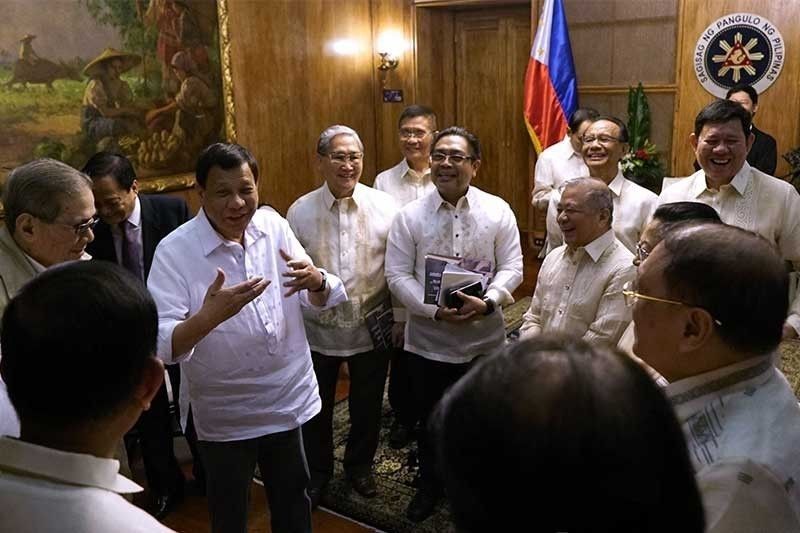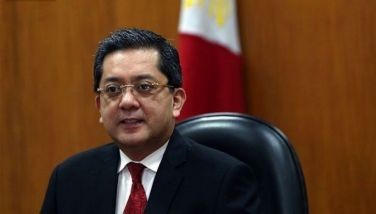ConCom defends proposed federal charter amid questions on timing, need

MANILA, Philippines — President Rodrigo Duterte's consultative committee on Tuesday discussed before the Senate the salient features of its proposed federal constitution, amid questions over the need to change the current charter and the public's opposition to it.
Ding Generoso, the spokesman for the consultative committee formed by the president for the creation of a draft charter, said the overconcentration of power in the national government should be addressed.
He noted that over the past years this overconcentration of political and economic power had resulted in the centralization of development in Metro Manila, Calabarzon and Central Luzon.
"You go further away from the center of power and economic activity (the poverty rate becomes higher)," Generoso said in his presentation before the Senate Committee on Constitutional Amendments and Revision of Codes chaired by Sen. Francis "Kiko" Pangilinan.
Generoso said that some of the special features of the proposed constitution were the self-executing anti-dynasty provisions up to the second degree of affinity.
The constitution would also bar succession of family members and their holding of multiple positions, he said.
Party-switching would also be prohibited, Generoso said.
Politicians can't switch parties during their term and two years before or after their election and can face removal from office, prohibition from appointment and running in the next election, Generoso said.
READ: SWS: Only 1 in 4 Filipinos aware of federal government
He said that federalization embraced the view that there should be no centralization of power which should be distributed between the national government and the proposed 18 federated regions.
Generoso said that the new constitution would adopt a federal-presidential system, which is familiar to Filipinos, a more representative legislature and strengthened constitutional commissions.
The federated regions would also be given sufficient political and economic power to sustain themselves while the national government would be tasked to ensure a permanent and indissoluble nation, he said.
The Senate's hearing comes just after a survey showed that two in three Filipinos were not in favor of amending the constitution now.
The same poll by Pulse Asia showed that a majority of Filipinos rejected the proposed shift to a federal system of government.
According to Pulse Asia, 30 percent of their respondents said that charter change should not be done now while 37 percent said that it should never be done now or any other time.
Generoso said that under the proposed charter the president would have the same powers but would be elected in tandem with the vice president.
They would have a four-year term and could run for another term and must have a college degree or an equivalent qualification.
Congress meanwhile would still be bicameral with two senators to be elected from each of the 18 regions, he said.
For the House of Representatives, 60 percent of its members would come from legislative districts while the rest would be elected nationwide by proportional party representation.
The members of Congress would have the same powers and should have a college degree or an equivalent qualification, Generso told the Senate panel.
Generoso said some of the biggest differences between the current constitutional and their proposed charter could be found in the provisions on the judiciary.
He said that they were proposing four high courts: the Federal Supreme Court, Federal Constitutional Court, Federal Administrative Court and Federal Electoral Court.
Each of these courts would have their own specializations, which Generoso said should reduce the number of pending cases before the current Supreme Court.
The appointment of the members of the high courts would also be divided, with one-third each coming from the president, who would appoint the chief justice, the legislature's Commission on Appointments and the judiciary.
The courts would also be given deadlines to resolve cases filed before them, Generoso said.
The country's constitutional commissions would also be given more power, Generoso said.
The ombudsman would also become a commission composed of a chairperson and four members to make it more effective in fighting graft and corruption.
Under the proposed charter, the federal government would be in charge of areas such as defense and security, foreign affairs, customs and tariffs, international trade and interregional infrastructure.
The federated regions meanwhile would have the power over their socioeconomic development planning, creation of sources of revenue, justice system for their laws, creation of their economic zones and local government units under their jurisdiction.
The government's taxation power would also be divided between the national government and the federated regions.
The federated regions shall also be entitled to not less than 50 percent of revenues coming from some taxes, Generoso said.
The federated regions would be headed by regional governors and deputy governors, elected in tandem by the legislative assemblies from among their members.
- Latest
- Trending


























